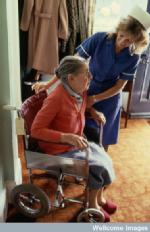Seminar 18: Caring for the Elderly
 |
One of the challenges for British society in the early twenty-first century is to meet the needs of an aging population, living longer, and, for some, living for many years in poor health. This has led to increased demand for hospital beds and residential care, or support at home, in a period where the welfare state is overstretched and under-resourced. This week we explore the problem of aging in society in the late nineteenth and twentieth centuries, and how geriatric care and social services strive to meet this demand. We also aim to understand the problems of aging and ill health from the perspective of elderly commentators.
1. How old is 'old'? How have definitions of old age changed in the 20th century? 2. What specific health issues are faced by older people?
3. How have medical interventions led to an improved quality of life for an aging population?
4. What health challenges have old people faced in insitutional care in the nineteenth and twentieth centuries?
|
Seminar Reading:
Susannah Ottaway, ‘Medicine and Old Age’, in Mark Jackson (ed.), The Oxford Handbook of the History of Medicine (Oxford: Oxford University Press, 2011), 337-54. e-book
Paul Bridgen, ‘Hospitals, Geriatric Medicine and the Long-term Care of Elderly People 1946-1976’, Social History of Medicine, 14 (2001) 507-23. e-journal
Pat Thane, 'Social Histories of Old Age and Aging', Journal of Social History, 37 (2003), 93-111. e-journal
Primary Sources
Marjory Warren, 'Care of the Chronic Sick: A Case for the Care of the Chronic Sick in Blocks in a General Hospital', The British Medical Journal, 25th December (1943), 822-3,
Marjory Warren, 'Care of the Chronic Aged Sick', The Lancet, 8th June (1946), 841-3.
Additional Reading:
L. Botelho and P. Thane, Women and Ageing in British Society since 1500 (Harlow: Longman, 2001).
Ann Bowling, Emily Grundy and Morag Farquhar, Living Well Into Old Age: Three Studies of Health and Well-Being Among Older People in East London and Essex (London: Age Concern, 1997).
D. Collins, ‘The Introduction of Old Age Pensions in Great Britain’, Historical Journal, 8 (1965) 246-59. e-journal
Martin Gorsky, Bernard Harris, and Andrew Hinde, ‘Age, Sickness, and Longevity in the Late Nineteenth and the Early Twentieth Centuries. Evidence from the Hampshire Friendly Society’, Social Science History, 30 (2006), 571-600. e-journal
Claire Hilton, 'Developing Psychogeriatric Services in England, 1979-89', Social History of Medicine, 30:1 (2017) 175-200. e-journal
Tenna Jensen, 'The Importance of Age Perceptions and Nutritional Science to Early Twentieth-Century Insitutional Diets', Social History of Medicine, 30:1 (2017) 158-74. e-journal
Stephen Katz, Disciplining Old Age: The Formation of Gerontological Knowledge (Charlottesville, VA: University Press of Virginia, 1996).
David I. Kertzer and Peter Laslett, Aging in the Past: Demography, Society, and Old Age (Berkeley, CA: University of California Press, 1995). e-book
Peter Laslett, A Fresh Map of Life: Emergence of the Third Age, 2nd edn (Basingstoke: Macmillan, 1996).
Margaret Pelling and Richard M. Smith (eds), Life, Death and the Elderly: Historical Perspectives (London: Routledge, 1991).
Moira Martin, 'Medical Knowledge and Medical Practice: Geriatric Medicine in the 1950s', Social History of Medicine, 7 (1995), 443-61. e-journal
Robin Means and Randall Smith, The Development of Welfare Services for Elderly People (Kent: Croom Helm, 1985). e-book
M. Pugh, ‘Working-Class Experience and State Social Welfare, 1908-1914: Old Age Pensions Reconsidered’, Historical Journal, 45 (2002) 775-96. e-journal
James C. Riley, Sick, Not Dead: The Health of British Workingmen during the Mortality Decline (Baltimore and London: Johns Hopkins University Press, 1997).
Pat Thane, Old Age in English History: Past Experiences, Present Issues (Oxford: Oxford University Press, 2002).
Pat Thane, ‘Social Histories of Old Age and Aging’, Journal of Social History, 37 (2003), 93-111. e-journal
Pat Thane, ‘Old Age’, in Roger Cooter and John Pickstone (eds), Companion to Medicine in the Twentieth Century (Amsterdam, etc.: Harwood, 2000), 617-32.
D. Thomson, ‘The Decline of Social Welfare: Falling State Support for the Elderly since Early Victorian Times’, Ageing and Society, 4 (1984), 451-82. e-journal
Peter Townsend, The Family Life of Old People: An Inquiry in East London (Penguin 1963).
Peter Townsend, ‘The Structured Dependency of the Elderly: A Creation of Social Policy in the Twentieth Century’, Aging and Society, 1 (1981) 5-28. e-journal
Charles Webster, ‘The Elderly and the Early National Health Service’, in Margaret Pelling and Richard M. Smith (eds), Life, Death, and the Elderly: Historical Perspectives (London and New York: Routledge, 1991), 165-93.
Essay Questions
How succesfully did the state meet the health needs of elderly people in the ninenteenth and twentieth centuries?
To what extent has growing old become medicalised?
